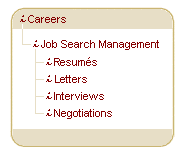Whether you are communicating on paper or on the Internet, you must be proficient at writing business letters.
Some general advice about using letters in your job search is provided here:
- Keep it simple. Follow a basic outline and don't be verbose.
- Make absolutely sure there are no errors in the letter. The first error is fatal to your cause.
- Strive for excellence, not perfection. Time is of the essence for you and for the employer.
- Keep track of every letter and resume that you send. It is not good to say, "Huh?" when they finally call you on the telephone.
- Always follow up. Use the telephone to verify a letter was received. It shows initiative and interest.
- Be persistent. Rejection letters sometimes result from temporary situations. Try again later.
|
If you don't feel proficient writing business letters, you might find the following guide useful:
|
|
cover letter
|
followup letter
|
acceptance letter
|
paragraph 1:
introduce or remind
|
I am responding to the ad ...
|
Thank you for speaking with me on ...
|
I am pleased to accept your offer dated ...
|
paragraph 2:
sell yourself
|
My backgroung matches your ...
|
My skills in that area match your ...
|
I am confident that I will contribute ...
|
paragraph 3:
commit to actions
|
I will call you on ...
|
I will call you on ...
|
I will arrive on ...
|
paragraph 4:
show appreciation
|
I appreciate your efforts ...
|
Thanks again for considering ...
|
I really look forward to ...
|
This guide is provided to help you get going. It is not the final word on how to organize your letters. Use your best judgment.
A Letter for Every Occasion
Frequent communication with a company is almost always a good thing. Every time they hear from you, they become more aware of you and your interest in their company. Whether by email or postal mail, it is a good policy to send letters at each stage in the process of securing that job. Here are some examples:
The Internet and the postal system are fine ways to communicate. But they are not your only tools. Letters show your professionalism, but not necessarily your initiative: use the telephone!

 Careers
Careers



